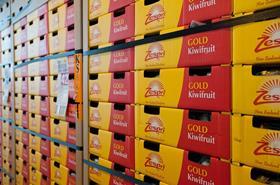
Zespri’s business in China has faced a delicate situation over the past few weeks following the arrest of the kiwifruit marketer’s Shanghai import agent Liu Xiongjie on suspicion of tax evasion.
Mr Liu, chairman of importer-distributor Shanghai Neuhof Trade Co, was arrested on 22 June and has been held by Chinese authorities since, accused of under-invoicing imported kiwifruit.
Asiafruit understands that Shanghai Neuhof Trade Co is the largest of Zespri’s four agents in China, distributing around 3m trays of Zespri kiwifruit in the Shanghai district last year.
Mr Liu’s arrest has caused some disruption to Zespri’s business in the region, although the company has said it has not had any significant impact on trade.
“We can’t really say that much, we just have to see how the investigation goes,” Zespri CEO Lain Jager told Asiafruit.
“We’re aware of it; we’re a witness in the investigation, but there’s been no effect on the business. When it came up, we were concerned if there was going to be a business continuity issue. But in the event it’s still running and people are still being paid.”
Industry sources have told Asiafruit that the New Zealand-based marketer initially had to divert 10 containers of kiwifruit from Shanghai to Taiwan in the wake of Mr Liu’s arrest, although the company has denied those claims.
“I’m not aware of any product that’s been diverted to Taiwan, but sales in Taiwan are going very strong, so it’s not unusual for shipments to be diverted there,” said Mr Jager.
Disparity in declared prices
According to a report from China Central Television (CCTV), officials from Shanghai Customs became suspicious of Shanghai Neuhof after finding that the prices it declared varied markedly on a number of occasions, even though it was the only sizeable kiwifruit importer in the region.
“After comparison and analysis, we found that the kiwifruit with a high declared price had the same specification and trademark as the kiwifruit with a low declared price,” Xie Liming, investigator of the Songjiang Division of the Anti-smuggling Bureau at Shanghai Customs, told China’s major state TV broadcaster. “If we want to check whether the company understates the true price for smuggling, we have to go to the company to investigate whether they have two sets of invoices and accounts, the real one and the fake one.”
Shanghai Customs contacted New Zealand Customs to check the reported price of the kiwifruit at the point of exit, and this enquiry revealed that the price Shanghai Neuhof declared to Shanghai Customs was much lower than what had been declared to New Zealand Customs.
On searching the company's operations, investigators unearthed plenty of data to confirm the company tampered with the customs declaration documents, according to CCTV’s report.
“The company asked the foreign enterprises to prepare fake invoices when they applied for Certificate of Origin. Then the company declared value to the Shanghai Customs with the fake invoices to evade taxes,” said Wang Jiabin, deputy director of the Songjiang Division.
Statistics from the Shanghai Customs office show that since 2007, Shanghai Neuhof smuggled around 30,000 tonnes of kiwifruit with a total value of Yn600m (approximately US$94m) and evaded Yn60m (around US$9.4m) in taxes. Those figures make it the largest fruit import smuggling case in China’s history, according to CCTV.
While officially arrested and under investigation for a large discrepancy between the actual value of Shanghai Neuhof Trade Co’s imports and that reported to customs, the underlying cause of Mr Liu’s arrest has been the subject of conflicting opinions in the trade.
‘Tall trees catch much wind’
Some industry sources told Asiafruit that under-reporting of import values is not uncommon in China, and suggested Mr Liu had been singled out in particular because of the size of his business and the way he conducted it.
One source said Shanghai Neuhof Trade Co had done well financially and was the leading player in the region, but contrary to Chinese tradition had not supported or invested back into the local community, prompting authorities to crack down as the company was expanding its business south into Guangzhou.
Pushing imports down the legal channel
But the arrest is being seen as a positive shift in the trade by some, with one Shanghai-based importer – who has also had its tariff reports investigated and confirmed by authorities – saying the major effect of the crackdown will be increased legitimacy of the trade.
“In the long run, we see this round of government roll-out `as` positive, as it regulated the whole sector and pushed the market to a more eligible track,” the source said
“Again, we agree that `the` ‘grey channel’ has become increasingly difficult and government has tightened supervision on many aspects. We are concerned as the government continues tightening policies.”
Which way now for Zespri?
While Zespri’s business is still running in China, the company is likely to be considering its longer-term distribution strategy in this rapidly emerging market, which is very much the growth generator for the business.
At last year’s Shanghai World Expo, Zespri chairman John Loughlin forecast that China could grow to account for 20 per cent of Zespri’s total business within 10 years, up from 6 per cent of annual sales at the time.
Shanghai Neuhof has played a key role in Zespri’s impressive growth in China, and the company’s large-scale cold storage facilities in Shanghai have helped the exporter to begin charter shipments there.



